How to know if your phone is hacked
Cybercriminals may hack your phone to spy on you, steal your money, or target your contacts with phishing scams. In this article, we’ll show you the signs that a hacker could have access to your device, and help you protect your phone from cyberattacks. We won’t be covering iPhones specifically in this article, as we’ve covered iOS hacking in another post; check that out to learn if your iPhone is hacked.
Table of Contents
Table of Contents
Can someone hack my phone?
Your phone can be hacked, just like any other device with internet connectivity. Phones are particularly tempting targets for hackers because these devices usually have access to a huge amount of user data, from banking information to social media passwords.
Hackers are always eager to infect your device with malware and trojans. By installing keyloggers on your phone, a cybercriminal can monitor your activity and secretly view your login data for websites and apps. In some cases, they can even turn hacked phones into cryptominers, generating cryptocurrency for the hackers while drastically slowing down device performance.
While your smartphone is immensely useful, it can put you at risk, which is why it’s so important to know how to spot signs of hacking.
How to know if your phone is hacked
Here are the most common signs that your phone is hacked:
1: You notice something you don’t recognize on your phone
Look out for apps you didn’t download, text messages you didn’t send, purchases you didn’t make, and suspicious phone calls.
2: Your phone works slowly
As well as being unusually slow, the phone uses more resources and battery power and becomes hotter than normal. Malware working in the background might reduce its power significantly.
3: Mysterious data usage spikes
Data usage spikes could occur without any changes on your part. Malicious processes might be consuming your mobile data in the background as they track what you do.
4: Strange behavior
Apps don’t run the way they should, switch on and off unexpectedly, or crash and fail to load.
5: Pop-ups
If you notice lots of pop-ups appearing on your screen, you probably have spyware or malware.
PRO TIP: Let your friends and contacts know if your device has been hacked. It’s likely that hackers will use your compromised phone, as well as any messaging apps you have installed, to launch more attacks on other people.
These signs can also alert about phone mirroring. Read our blog on how to detect mirroring on your phone to find out more.
How your phone can be hacked
There are many ways to hack your phone. Some don’t even require advanced tech knowledge:
- Sim swap attack. By using this attack, hackers can transfer your phone number to their own SIM card and take over your accounts.
- Spyware. Some spy apps are pretty easy to get hold of and can be used by a person without advanced IT knowledge. This lets them remotely monitor your phone activities. A person can install such an app by getting a direct access to your mobile device.
- USB cable. A USB cable or charger lead could be used to hack your device. When a phone is connected to another device with a USB cable — to a laptop, for example — data can be sent via the USB. That means, in theory, a computer infected with malware or viruses could automatically infect your phone if you connect the two. This is true even if you’re only using the USB link as a way to charge your phone.
- Public Wi-Fi or charging stations. You might get malware via public Wi-Fi networks or charging stations. Hackers can set up fake Wi-Fi networks, called evil twin networks, to redirect you to malicious websites or steal data via USB cable at a charging station.
- Phishing attacks. You could be targeted with phishing messages, emails or texts that contain malicious links to install malware and snatch your data.
- Malware infection. You might also download malware from suspicious sites while downloading apps or by clicking on malicious pop-ups or links.
Make sure to check out our video on how to know if your phone is hacked below.
How to know if your phone camera is hacked
If you suspect that your phone camera was hacked, there are a few more tell-tale signs that someone else is using it remotely. For example, you may notice photos and videos in your gallery that you don’t remember taking.
Of course, you can accidentally record something, but if you keep finding new ones, it’s a sign that someone might have control over your camera. The flash lighting up when you’re not using your phone is another thing to look out for.
Want to read more like this?
Get the latest news and tips from NordVPN.
How to remove a hacker from my phone
Here’s what to do if your phone has been hacked:
- Change your passwords immediately. Reading our tips on how to create a strong password will help you. You can also use our NordPass app to store your strong and complex passwords.
- Run anti-malware software to detect any malicious applications and processes. Just make sure you use safe and reliable security software that doesn’t track and gather your data.
- Turn off your mobile data and Wi-Fi when not using them. This might prevent a malicious app from using your data and can disrupt its activity if it relies on an internet connection.
- Remove the suspicious apps immediately. If your security apps don’t find anything, or if you don’t have any, it’s still a good idea to delete any apps you downloaded right before the problems started appearing.
- Inform your friends and contacts and instruct them to ignore suspicious messages coming from you.
- Restoring your Android phone to its factory settings. That might help if tons of pop-ups or malicious apps have made your phone impossible to use. This one is a nuclear option, so use it only as a last resort.
Restoring your Android phone to its factory settings
For Android users, it’s important to backup anything essential before restoring your Android to factory settings.
1. Open “Settings.”
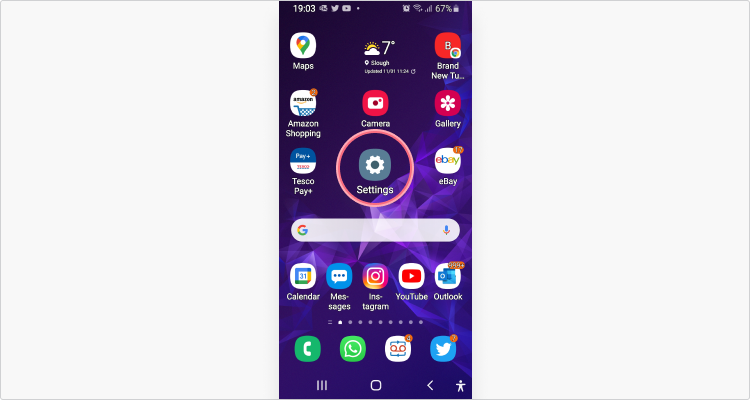
2. Go to “General management.”
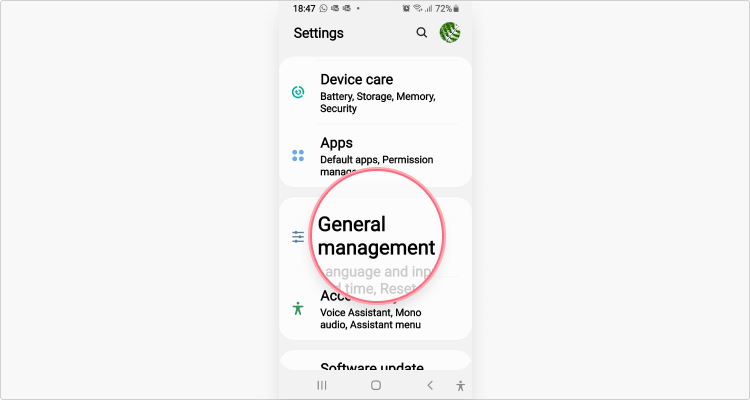
3. Tap “Reset.”
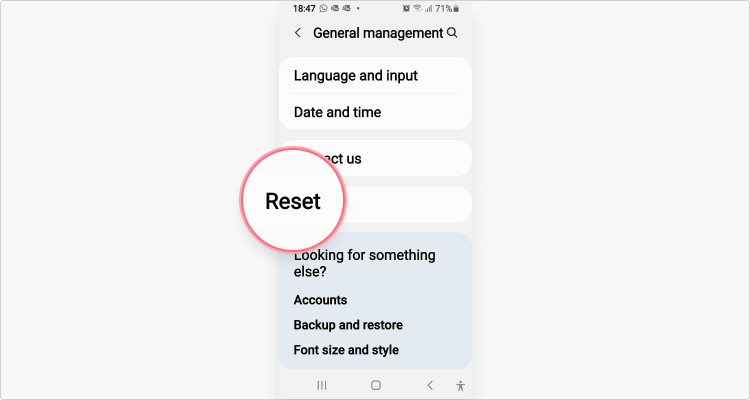
4. Press “Factory data reset.”
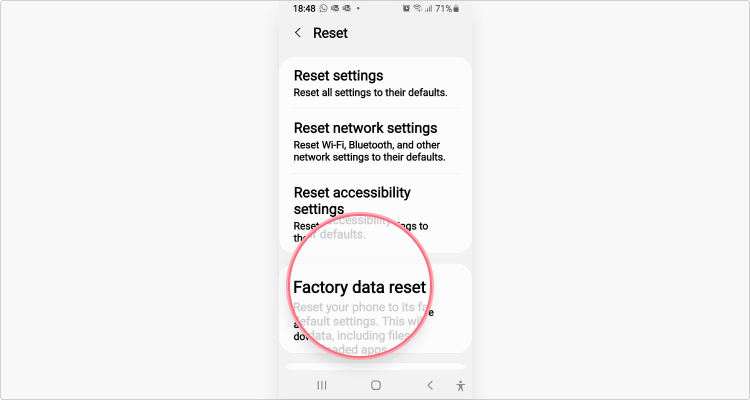
5. Tap “Reset.”
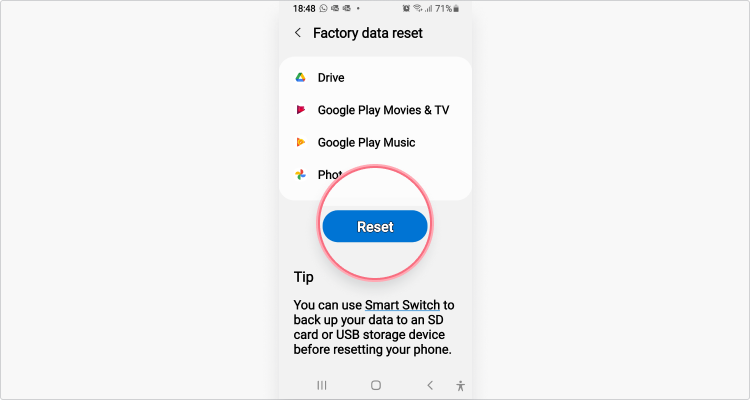
How to block hackers from hacking your phone
To prevent your phone from being hacked, do the following:
- Turn off your hotspot when in public. If you do need to turn it on, make sure you’ve made the settings as secure as possible.
- Avoid Wi-Fi or charging spots you don’t trust. If you must use public Wi-Fi, never do so without a VPN. Also, don’t forget to disconnect from public Wi-Fi once you’ve stopped using it.
- Switch your Bluetooth off when not using it as it can also be an access point for hackers.
- Lock your phone with a password or lock screen.
- Never leave your phone unattended and don’t let people you don’t know use it.
- Update apps and operating systems regularly to make sure they have the latest security patches.
- Regularly review what apps your phone has to see if there are any you don’t recognize.
- Avoid public USB charging stations. If you often must charge your phone in public places, consider using a USB data blocker. It’s a small device that prevents any data from entering your phone through a USB connection and can protect you from juice jacking – a method of spreading malware through public USB ports.
- Do not open suspicious messages, links, or files. They can be malware or spyware in disguise.
- Lock your SIM card if you think the device is compromised; your service provider will usually be able to lock and unlock the card if you contact them.
- Install anti-malware apps, which can remove malware soon after it is downloaded, or prevent the infection in the first place.
- Do not use sites you don’t trust. They are a potential source of malware.
- Use a VPN. You can use a VPN for iOS or Android to protect your phone from data snoopers and hackers.
Can a phone be hacked while turned off?
The short answer is no, your phone cannot be hacked while it’s turned off. Phone hacking, even remotely, only works if the device being targeted is on.
That doesn’t mean you’re personally safe from hackers while your devices are off. Criminals could spoof your number, making calls from their own devices and pretending to be you to try and extract information or money from other targets. And if your phone had been jailbroken, whoever jailbroke the phone could (in theory) install malware that would activate when the device was switched back on.
Yet for all intents and purposes, you should be confident that your phone will not be hacked while it’s fully switch off.
Can hackers hack your phone by calling you?
No, not directly. A hacker can call you, pretending to be someone official, and so gain access to your personal details. Armed with that information, they could begin hacking your online accounts. But they can’t break into your phone’s software and modify it through phone calls alone.
However, that’s really a social engineering attack, rather than a direct phone hack. In real terms, phone calls themselves just don’t have the power to spread malware or give hackers access to your device.
Is there an app to see if my phone has been hacked?
There are apps that will improve your device security by notifying you of unusual activity, to ensure that you’re making use of basic security features like Screen Lock, Face/Touch ID and two-factor authentication (2FA).
Specialized spyware apps are also available; these programs can trawl your phone for hidden malware and help you identify hacks early.
Browsing privately with a VPN
Using a VPN will enhance your overall security and privacy.
NordVPN is an easy-to-use app designed for both novice and expert users. Not only does it provide you with top-notch encryption, but can also block suspicious ads and pop-ups, which are a common way to distribute malware. NordVPN offers an additional Threat Protection Pro feature that helps you to identify malware-ridden files, stops you from landing on malicious websites, and blocks trackers and intrusive ads.
NordVPN also has the Kill Switch function, which will disconnect you from the web in case you lose a VPN connection. Moreover, a single NordVPN account allows you to protect up to 10 devices, so you could have your entire household protected.
If you’re looking to turn your smartphone into a fortress, a VPN service is the answer.
